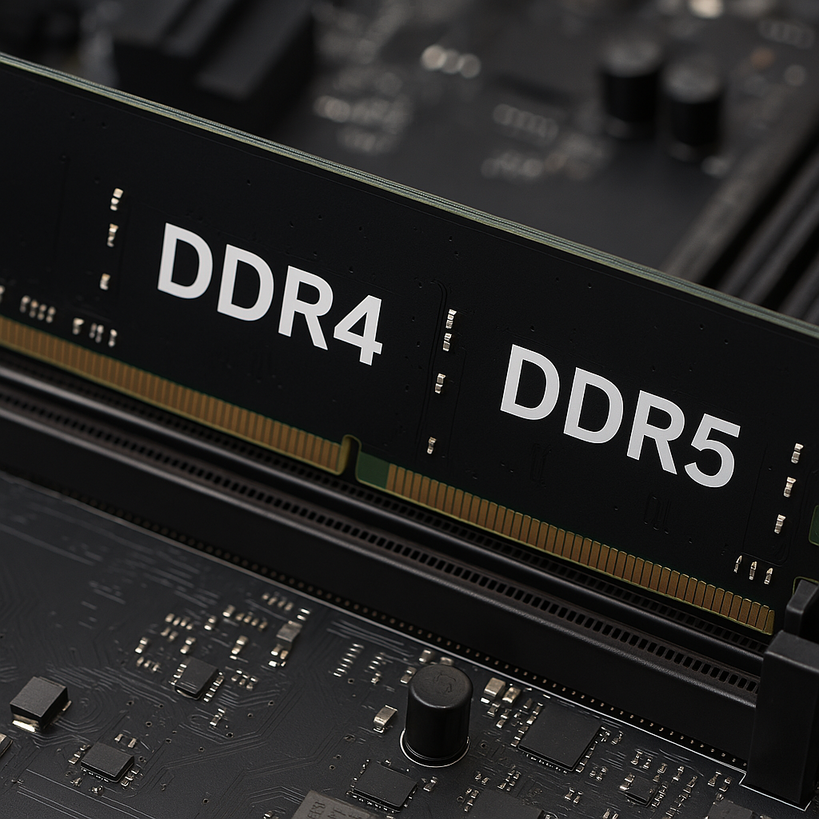DDR4 vs DDR5 RAM, Does DDR5 Make a Noticeable Difference?

Choosing the right memory for your computer has never been more important—and complex. With the rise of DDR5, many users find themselves searching for clear answers to the question: DDR4 vs DDR5, which one should I get? This comparison isn’t just about raw speed; it’s about real-world value, especially if you’re into gaming or high-performance computing.
Whether you’re building a new PC, benchmarking GPUs and CPUs, or simply looking to future-proof your setup, this article will help clarify the main differences between DDR4 and DDR5 memory RAM. We’ll look at performance, pricing, and how each impacts your gaming experience and overall system responsiveness.
What Is the Difference Between DDR4 and DDR5 RAM?
The term DDR stands for Double Data Rate, and the version number indicates its generation. DDR4 and DDR5 refer to two generations of memory RAM used in modern computers.
DDR5 RAM offers higher bandwidth and lower power consumption than DDR4. DDR5 also supports higher module densities, meaning you can install more memory per slot. These changes theoretically lead to faster data processing and smoother multitasking.
However, to fully benefit from DDR5, you need a compatible motherboard and CPU. Many current mid-range systems are still optimized for DDR4, so the upgrade may not always result in a noticeable improvement.
DDR4 vs DDR5 Gaming: Is There a Real Difference?
For gamers, the key question is whether DDR5 actually boosts performance in real-world gaming scenarios. The answer depends on the game, GPU, and CPU you’re using.
In benchmark GPU tests, the performance gap between DDR4 vs DDR5 gaming setups is minimal—often under 5 FPS for most titles. Games that rely heavily on CPU performance and memory bandwidth, such as simulation or open-world games, may benefit slightly more from DDR5.
However, if your CPU or GPU is already a bottleneck, switching RAM types will offer limited gains. For example, if you’re running a high-end graphics card with a lower-tier CPU, the added bandwidth of DDR5 won’t significantly help.
Benchmark CPU and GPU Results with DDR5 Memory
When looking at benchmark CPU tests, DDR5 shows more promise. In multitasking environments or CPU-bound tasks like video editing and 3D rendering, DDR5 delivers performance gains of up to 10-15% compared to DDR4.
GPU benchmarks, on the other hand, are less influenced by memory type—unless you’re dealing with integrated graphics. Systems with integrated GPUs see a more noticeable benefit from DDR5 due to the shared memory bandwidth.
Still, for most desktop gamers with a dedicated GPU, the gains may not justify the cost just yet.
Is Now the Right Time to Upgrade to DDR5?
Whether or not you should upgrade to DDR5 RAM depends on your system and usage. If you’re already planning a full upgrade and are investing in the latest CPUs like Intel 13th-gen or AMD Ryzen 7000 series, going DDR5 makes sense.
However, for budget-conscious builders or those looking for incremental upgrades, DDR4 still offers excellent value. It’s cheaper, widely available, and supported by a broader range of motherboards.
Visit pcmemoryfinder.com to explore compatible RAM options, prices, and speed comparisons.
DDR5 Memory RAM: Future-Proof or Hype?
DDR5 is the future standard, and support across chipsets is growing fast. Over the next few years, more applications and games will likely be optimized for DDR5’s capabilities.
That said, DDR4 is far from obsolete. For many users—especially gamers and everyday PC users—the upgrade to DDR5 won’t bring game-changing improvements just yet.
Conclusion: DDR4 vs DDR5 — Which One Should You Choose?
If you’re building a brand-new PC or doing professional-level content creation, DDR5 RAM is a good long-term investment. It offers higher theoretical performance and will eventually become the default memory standard.
But if you’re focused on cost-effectiveness, gaming on a budget, or doing standard productivity tasks, DDR4 still holds its ground. When comparing DDR4 vs DDR5, think about your specific use case, and consult benchmark GPU and CPU data before deciding.
Whichever path you choose, be sure to check compatibility and performance specs using tools like pcmemoryfinder.com to make the most informed decision.
Also be sure to check out my Memory RAM Speeds Explained: The Affordable Key to Better Performance? blog to learn more about the all imporant memory speeds.